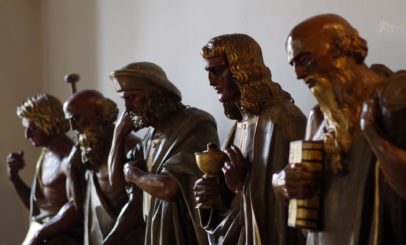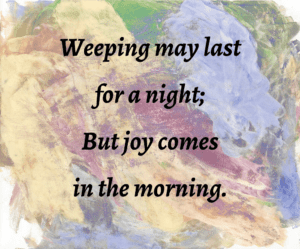
The week before Easter, I go to confession with a whole two pages’ worth of sins I’ve been collecting throughout Lent. Pastor Beverly welcomes me into her office, and together we open the Episcopal Book of Common Prayer to the brief service of the Sacrament of Reconciliation. We say together:
Have mercy on me, O God, according to your loving-kindness;
in your great compassion blot out my offenses.
Wash me through and through from my wickedness,
and cleanse me from my sin.
For I know my transgressions only too well,
and my sin is ever before me.
Holy God, Holy and Mighty, Holy Immortal One,
have mercy upon us.
I feel myself shrinking back as we get closer to the point when I have to actually say out loud what I’ve done, what I’ve thought and said, and perhaps worst of all, what I have not done. I continue:
Holy God, heavenly Father, you formed me from the dust in your image and likeness, and redeemed me from sin and death by the cross of your Son Jesus Christ. Through the water of baptism you clothed me with the shining garment of his righteousness, and established me among your children in your kingdom. But I have squandered the inheritance of your saints, and have wandered far in a land that is waste. Especially, I confess to you and to the Church…
And the time has come to recite my sins.
Somehow I expect Beverly to gasp dramatically in shock and horror whenever I mention a particularly heinous offense. But she listens quietly, nodding occasionally. Still, I find myself unable to meet her gaze as I’m reading off certain things.
I finish going through the list, and before I can even set it back down on my lap, she immediately takes it from me. I’m not allowed to keep it; she’ll destroy it for me later as a sign that God has erased these sins from my record. I have to fight the suspicion that she’s actually going to copy the entire list and post in on Facebook.
Receive me again into the arms of your mercy, and restore me to the blessed company of your faithful people; through him in whom you have redeemed the world, your Son our Savior Jesus Christ. Amen.
As the Book of Common Prayer prescribes, Beverly then offers words of counsel and encouragement. Even though Pastor Beverly is perhaps the least intimidating and least judgmental person I know, this part always scares me. What will she say about all I’ve just divulged? With immense gentleness, she points out that God has given me a desire to please Him with the way I live and prioritize my activities, and she tells me she believes He will bless me for this.
As the Book of Common Prayer prescribes, Beverly then offers words of counsel and encouragement. Even though Pastor Beverly is perhaps the least intimidating and least judgmental person I know, this part always scares me.
I wouldn’t have been able to convince myself of this on my own.
My overactive conscience is always a little suspicious that any time I might feel like I’m pleasing God, I could easily be deceiving myself.
But this affirmation is coming from Beverly, someone in spiritual authority over me. She is a priest who represents Christ and his mercy. If she believes I want to follow God and he will bless me for that, it’s a little easier to trust that that’s true.
She places a hand on my head to make the sign of the cross.
Our Lord Jesus Christ, who has left power to his Church to absolve all sinners who truly repent and believe in him, of his great mercy forgive you all your offenses; and by his authority committed to me, I absolve you from all your sins: In the Name of the Father, and of the Son, and of the Holy Spirit. Amen.
Now there is rejoicing in heaven; for you were lost, and are found; you were dead, and are now alive in Christ Jesus our Lord. Go in peace. The Lord has put away all your sins.
I go home feeling lighter, freer than before.
It’s not as if my own personal times of confession to God are ineffective. But sometimes the guilt still nags at me—was I really contrite for what I confessed? Was there something more I should be doing to put certain sins to death?
So it helps me to have the reassurance of another person to confirm, “You are forgiven. Let go of the guilt that has been burdening you, and rejoice in the freedom that comes from the grace of God!”
Allison Sheeler Duncan studied English and theology at Eastern University and is now a writer and editor at a university in southeast Pennsylvania. She writes about grace, beauty, and justice at her blog, Shining from Shook Foil, where this piece first appeared. She enjoys growing flowers and heirloom tomatoes, watching superhero movies, and writing in calligraphy.


